S Korean carriers ready to give D&D discounts as trucker strike eases
South Korean container shipping companies will temporarily reduce demurrage and detention charges incurred as a ...

South Korean logistics group LX Pantos has signed an agreement with the Korea International Trade Association (KITA) to provide discounted container transport to help local garment exporters facing difficulties getting goods to Europe due to the Russia-Ukraine war.
The exporters would use cheaper sea freight to get the goods to Russia, and then rail the goods to Europe, but sea freight is no longer viable as many liner operators have suspended sailings to the sanctioned country.
Now, non-sanctioned goods are being transported via ...
Maersk Air Cargo sees volumes fall as it aims for 'margin in favour of revenue'
Keep our news independent, by supporting The Loadstar
Container spot rates diverge: to Europe still falling, but firmer to the US
Hapag-Lloyd won't take bookings if port congestion leaves cargo stranded
Ecommerce likely the front-runner in resurge of transpacific trade after deal
China-US trade tariff pause could drive a rebound for transpacific rates
Volume surge and an early peak season? 'Don't celebrate too soon,' warning
Airfreight players eye new routes as demand on the transpacific nosedives
Service chaos from trade ban with India a problem for Pakistan shippers
Airfreight rates ex-China 'loss-making', but hopes of a trade deal stay high
Indian coastal freight attracts major carriers, but regional tension disrupts
Serious threat to jobs in US logistics as tariffs cause economic 'stagflation'


Comment on this article